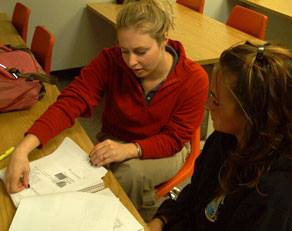Middle States Self Study Discussed at Open Forum
Five members of the Frostburg State University campus community joined Dr. Sydney Duncan, Middle States Committee Chair, at an open forum to discuss the Middle States Self Study Report, which was released in mid-November.
“People are just swamped,” she said on the low attendance, adding that only four people joined her at the first forum, held on November 24. She also commented that she hasn’t heard much feedback from the campus community. The comment period for the report ends on December 15.
Duncan expressed optimism in regards to the report and noted the university’s proactiveness in addressing the concerns brought to light by the report.
“Middle States is not going to shut our doors,” she said. “We might get a smack here or there, but most universities do.”
Although Duncan said the university may get “knocked pretty hard” for its student learning outcomes for the general education program, the university is already working to improve that area.
The committee has recommended that the university “Implement a sustainable process for the assessment of student learning outcomes in the University’s General Education Program.”
“We’re not going to wait for Middle States,” she said.
According to the report, the general education program is responsible for developing seven skills: critical thinking, information literacy, oral communication, quantitative reasoning, scientific reasoning, technology literacy, and written communication.
“The GEP has not been reviewed in 10 years and a broad examination of both the GEP content and assessment processes is needed,” the report said. “To that end, the University has joined with other USM schools in conversations sponsored by the Kirwan Center for Academic Transformation, whereby discussions of best practices can take place across the System. Additionally, a General Education Review Committee, made up of faculty and staff, has begun to reexamine the GEP. A proposal for assessing GEP courses using a model based on the American Association of Colleges and Universities (AACU) VALUE rubrics is also under discussion.”
As a part of addressing this, the university will begin using predictive analytics to analyze student demographics and determine the risk factors that affect course completion, as well as to develop intervention strategies to improve course completion rates.
In addition to this, Duncan said that by the end of January, the university will have drafted an institutional effectiveness plan, which will assist the university in meeting its strategic priorities.
The President’s Advisory Council for Institutional Effectiveness will be re-constituted and re-focused in the spring, focusing more advising the university’s action plan on an institutional level. Duncan said that PACIE’s operations will be “much more transparent.”
“We aren’t where we should be,” Duncan said. “No university is ever done improving.”
The 100 page self study, which was emailed to students, faculty, staff, and members of the alumni and foundation boards, details how the university is complying with the 14 Middle States standards and how it can improve its practices. A copy of the draft can be found here.
The final draft of the study will be submitted in January 2016, and the accreditation team will be visiting from March 27-30, 2016.



